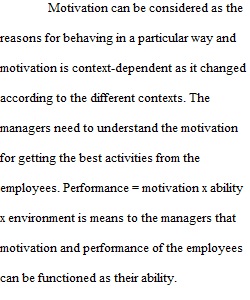


Q What is motivation? Is motivation stable (like personality) or is it context-dependent? Why do managers need to understand motivation? What does this mean to managers? Performance = motivation x ability x environment Early motivation theories: Maslow’s hierarchy of needs ERG theory Two-factor theory Acquired needs theory Process-based theories of motivation: equity theory expectancy theory reinforcement theory Explain and give example REACTIONS TO INEQUITY (1) distort perceptions (1) increase referent’s inputs (2) reduce own input (2) increase own outcomes (3) change referent (3) leave situation (4) seek legal action OTHER ASPECTS OF EQUITY THEORY (4) overpayment inequity INDIVIDUAL DIFFERENCES (5) equity sensitivity (5) benevolents (6) entitleds OTHER ASPECTS OF FAIRNESS (7) distributive justice (8) procedural justice (8) interactional justice Explain REINFORCEMENT THEORY (1) positive reinforcement (2) negative reinforcement (3) extinction (4) punishment REINFORCEMENT SCHEDULES (5) continuous schedule (5) fixed-ratio schedules (6) fixed-interval schedules (7) variable ratio (8) OB Mod Are these theories useful? How can managers use these theories to motivate employees? Explain and give examples (1) job specialization (2) job rotation (3) job enlargement (3) job enrichment (4) job crafting (5) job characteristics model (5) skill variety (6) task identity (6) task significance (7) autonomy (8) feedback from the job itself Goal setting theory How does it work? Are there any downsides to goal-setting? How can managers use goal setting to motivate workers??
View Related Questions